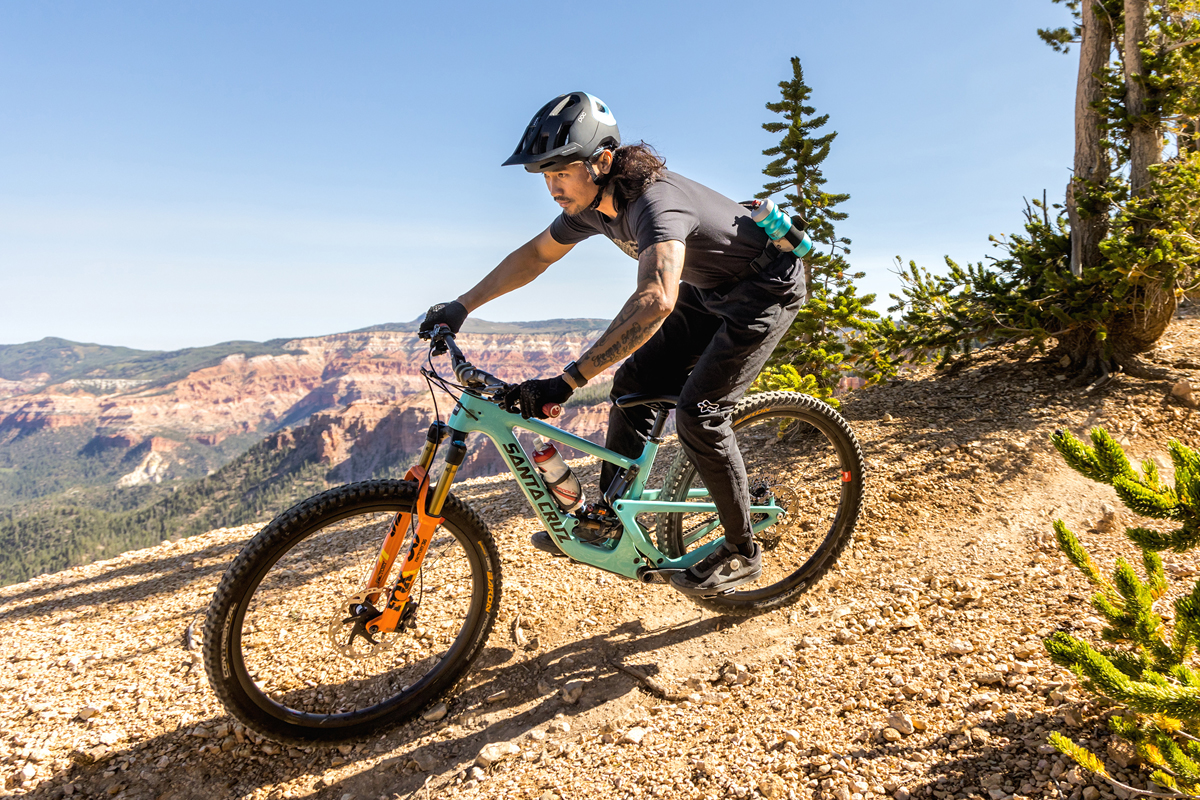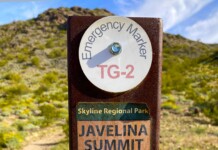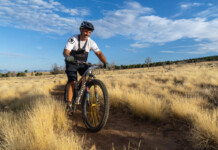By David Wiens and Andre Shoumatoff — Mountain bikers have joined forces with equestrians, hikers, trail runners, and motorized users to create an exciting new campaign and program for increasing quality of experience for all. The program and campaign is called Trails are Common Ground. It’s now slated to likely become the largest single widespread trail etiquette campaign, included with a new, standardized national trails manage management system, brought to us by a new unified partnership of these various groups.

As we all know, trail use was dramatically increasing prior to Covid, then the pandemic hit, and all of a sudden we had massive numbers of new and formerly-active people getting back onto the trails. This sudden and unprecedented interest accentuated the challenges of trail management and lack of support for trail managers from a national level, as well as the considerable need for a new, standardized, well-marketed trail etiquette program oriented to all users. Likewise, the landscape of user types has also changed. Handicapped users are now recreating on dirt trails with electric motors, plus the need for addressing the correct implementation new technologies like the rise of popularity of pedal-assist mountain bikes and types of motorized technologies has only further-exacerbated the issue.
Recognizing this, IMBA, the International Mountain Bike Association, stepped up to create (and is now administering) this program with, and on behalf of the leaders from a variety of different user types and several organizations championing diversity and inclusion. The groups have been meeting since spring and the campaign launched in August, and is currently slated to run in perpetuity. IMBA donated several hundred thousand dollars to get the program off the ground, and dozens of other organizations and businesses have verbally committed to additional support and funding to help make the program truly effective.
Leading the messaging for Trail are Common Ground is an effort to make trails and trail systems welcoming and safe for all people. Everyone should be able to benefit from fitness and trail-based recreation and removing some of the barriers to participation is long overdue. But most notably, people of color have been underrepresented on trails and the Trails are Common Ground effort, with the help of several groups focused on DE&I, aim to help develop racial inclusivity in a landscape that has traditionally been overwhelmingly white.
Hitting closer to home for existing users, encouraging a new general of positive interactions among trail users will also only improve everyone’s experience on the trails. TACG has created a new, well-funded campaign run by several professional marketing agencies, to push a new, widespread ethos of kindness when using trails. If use of trails can be lead with kindness and respect for others, regardless of who they are and how they choose to enjoy trails, user conflict will be avoided and quality experiences for everyone should increase. Likewise, committing to simply being aware of the surroundings and others while using trails will make a big difference, not unlike when we get behind the wheel of our cars.
An awareness mindset, even though we may be out to unwind, can helps us all get along better. Trails are Common Ground will ask trail users to obtain knowledge specific to their chosen method of enjoying trails and will create this material to allow a solid understanding about what to expect from, and how to interact with users of trail.
Likewise, mountain bikers new and experienced, can also benefit from having a strong base of knowledge, particularly because we’re not only consistently the fastest users but we’re often relatively quiet. One of the primary concerns often brought up about mountain bikers is our sudden appearance at speed, both from behind and head on. TACG will develop and implement a new system of etiquette for mountain bikers so we can have less impact as most-dangerous users of non-motorized trails.
The same process of acquiring knowledge — both specific to them and what to expect from other types of trails users — applies to hikers, trail runners, equestrians and motorized singletrack users. Trail users of all kinds operating from a solid base of knowledge and increasing experience, combined with a wider-spread approach kindness, awareness, and inclusivity will enhance everyone’s experience on trails and TACG will create this.
Finally, phase II of Trail are Common Ground, launching early next year, will be a new, standardized system for developing and managing trails for trail managers. This is both to increase efficiency and to develop new, universal standard for both managers and users so we’re all on the same page and less on our own. These new systems, designed to help addressing areas conflict and to help with solutions such as wider use of directional trails, will enhance user experience, reduce the opportunities for conflict and increase the effective carrying capacity of trails and trail systems. There are growing numbers of these innovative systems currently on the landscape and the Trails are Common Ground movement, along with land managers, trail professionals, advocacy organizations and other stakeholders continue to innovate the planning, design and construction of trail systems that will be distributed through TACG.
For more information go to www.trailsarecommonground.org, and feel free to follow the Instagram and Facebook accounts for updates as the program grows to full fruition. You’re also welcome to contact us through a manner of channels if TACG is something you or your organization would like to become a supporter or participant in. TACG is already working with the Utah Office of Outdoor Recreation and plans to be an active participant in its Utah Trails Forum program.
Inclusivity on the Trails
We can all do our part in making the trails places of Respect, Inclusivity, Safety, and Enjoyment for everyone. Whatever our chosen recreation activity on any given day, let’s keep these things in mind:
- For the best trail experience possible, we need to explore and embrace guidelines for local trails. What to ride and where and do-so legally and with respect.
- All trail users should yield to equestrians. For other right-of-way protocol, when in doubt, yield (with a smile). Mountain bike specifics are below.
- Let’s be sure to be accepting, inclusive, and welcoming of all types of people however they choose to recreate, including their backgrounds, identity, ability, and speed.
- Let’s also be sure to be respectful of the history and customs of the original stewards of our land and consider supporting efforts to help protect our landscape.
Mountain Bike Trail Etiquette 101 / Recap
- Yield to foot travelers, equestrians, and others when appropriate. When riding downhill, we yield to uphill cyclists and other traffic. We should also be cognizant of what users with disabilities may need.
- Consider that multi-direction, multi-user trails should be treated with extra consideration of risk of impact, so we should rider slower and with additional caution
- Let’s be sure to ride in control at all times so not to put the safety of others in jeopardy. This means we need to slow down for blind corners, particularly on multi directional trails.
- We need to be aware of the risks and consequences associated with riding closed trails, or trails that aren’t open for our type of riding. For example, mountain bikers should not ride trails for hikers and those on eBikes should only ride on trails approved for eBikes. Ignoring these rules can jeopardize our access now and in the future.
- When attempting to pass, it’s important to announce our presence with a bell or our voice, particularly when encountering users from behind. It is important to be patient and pass with kindness and respect.
David Weins is the Executive Director of IMBA. Andre Shoumatoff is a consultant in Utah helping with the program.








